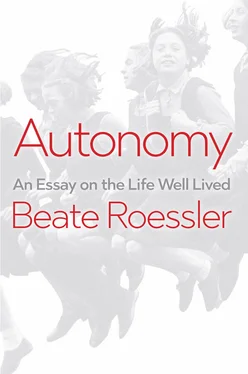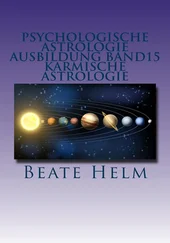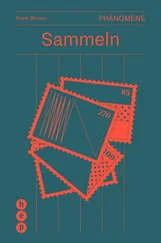Murdoch, writing in Hilary’s voice, describes why this is interesting in the context of being skeptical about the possibility of planning out one’s own life: “Yet such things happen to men, lives are thus ruined, thus tainted and darkened and irrevocably spoilt, wrong turnings are taken and persisted in, and those who make one mistake wreck all the rest out of frenzy, even out of pique.” 5
The events with which Hilary is confronted are almost exaggeratedly fateful. They seem to be entirely out of his hands, contingencies that make a determinable life, a self-determined life, impossible because it is utterly unclear what autonomous, authentic decisions would actually look like under such catastrophic conditions, what acting with plans and goals would even mean. “Yet such things happen to men” – and things that happen to us are the exact opposite of those aspects of life that we determine ourselves.
Fate, however – and Murdoch suggests this, too – is not such a simple matter. “The strange thing about fate,” the philosopher and psychoanalyst Jonathan Lear writes, “is that it does not fit neatly on either side of the me/not-me divide.” 6That is, the extent to which such events are not also due to our own actions, our own complex, difficult identities, remains unsettlingly open. Hilary’s repetition compulsion, for example, may be attributable to his own obsessions to a far greater degree than he recognizes or would like to recognize. And in any case, these extraordinary coincidences – the love affairs, the tragic accidents, the catastrophic repetitions – are only one side of the coin. The other, more important form of contingency – or bad planning – is the utterly common and familiar one that entangles and binds the protagonists in different and instructive ways in their own personal, ordinary chaos, their totally normal daily lives. Above all, it is the everyday problem of dealing thoughtfully and sensibly with our own decisions, intentions, possible choices, social relationships, and social obligations that throws a skeptical light on the scope of self-determination.
This “fatalistic feeling of helplessness,” as Murdoch calls it, is especially clear in the case of one of her other unfortunate protagonists, John Rainborough, another midlevel civil servant in a dubious public administration job, from the novel The Flight from the Enchanter :
Rainborough was sitting in his drawing-room trying to make up his mind to telephone Agnes Casement. He had promised to ring her during the afternoon, but had kept putting it off. It was now becoming, in equal degrees, both essential and impossible that he should do so at once; and as he meditated upon this, turning it into a problem of metaphysical dimensions, it gave him the image of his whole life. For Rainborough was now engaged to be married to Agnes Casement. How this thing had happened was not very clear to Rainborough. Yet it was, he was determined to think, quite inevitable. That much was certain. Must face up to my responsibilities, said Rainborough vaguely to himself as he contemplated the telephone. Need ballast. All this wandering about no good. Must root myself in life. Children and so on. Marriage just what I need. Must have courage to define myself. Naturally, it’s painful. But best thing really. That’s my road, I knew it all along. 7
Rainborough’s reflections come too late. He is already stuck in a muddle that he isn’t entirely sure how he got into. His fatalistic feeling of helplessness leads him to ex post rationalizations (“Must root myself in life. Children and so on. Marriage just what I need.”) that are of course not particularly authentic because they only feign decisions and desires that are not actually entirely his own. Rainborough evidently knows that he must act, that he has to determine his life through these very social relationships. But he does not do so. It has always already been too late.
Now one might argue that this merely demonstrates a lack of reflection and good sense, a simple failure on the part of Murdoch’s middle-class or lower-middle-class agents. These are people who fail because they do not even meet the standard that they themselves very well could meet. This standard of reflection and having good reasons for acting, of decisiveness and strength of will, is by no means too demanding. Basically every moderately sensible person could live up to it, and if they don’t, that’s their own fault. These are agents who don’t know themselves well enough, although they could if they put in sufficient effort, actors who are alienated from themselves, not one with themselves, not authentic – although they could be.
But this argument falls short, or at least does not get at the whole truth. For the true-to-life entanglements of Murdoch’s protagonists demonstrate that confronting the contingencies and social complications that arise in our own lives can indeed lead to justified doubts about our ability to determine our lives ourselves. It is precisely the ordinariness of these characters and their experiences that casts doubt on the prospect of self-determination. For if my life is defined not by my decisions or my actions but by contingency and indeterminacy, by the social ties and relationships that I am always already entangled in, then it becomes difficult to believe that my own reasoning and my own actions can be decisive factors in my life. The abysses into which Murdoch’s protagonists often fall, along with the melancholy apathy that goes hand in hand with their doubts about the use or point of life and their ability to determine their own lives, make it clear that lived everyday experiences – whether autonomous or precisely not – have a phenomenology and plausibility all their own, one that for the most part is better described by authors of fiction than through contrived – at times downright clumsy – philosophical examples. That is why I will continue to draw on examples from literature in the ensuing chapters.
Despite all of these illuminating descriptions of the non-self-determined aspects of everyday life, however, it is also clear that, in important dimensions of life, self-determination remains our guiding principle – this is the only reason why we and Iris Murdoch can even describe the failure of self-determination as such. It is only in contrast to the normative idea of autonomy that contingencies, obligations, psychological inabilities, and structural obstacles can be characterized as such. Autonomy, I want to argue, has value and significance for us because it is constitutive of our ability to shape ourselves and the world and adopt them as our own. Yet ambivalence, self-alienation, our own inscrutability to ourselves, and structures that impede or obstruct autonomy are all part of our autonomously lived everyday experience – and this is precisely why we are confronted here with tensions.
Personal autonomy, however, also has a decidedly political side. As the Lebanese author Samir Frangieh explains:
I believe that the most important phenomenon that we have witnessed during the revolutions is the rediscovery of personal autonomy. In other words: people are conscious that they can become the makers of their own history. In fact, this is rather new in a region where for decades the individual has been reduced to groups, groups to parties representing them, and parties representing them to their leader. As a result, we found ourselves in a situation in which entire countries were reduced to one person. Examples are Assad’s Syria and the entire Arab world, which was merely defined by 10 names. We are talking about 500 million people here, reduced to between 10 and 15 names. This is precisely what the Arab Spring has changed. 8
This political side of personal autonomy still proves to be explosive, not just as a call for change in non-democratic countries but also within liberal-democratic societies: when the limits placed on government encroachments on personal autonomy become structurally compromised, when rights have only formal rather than any material validity, when intrusions by the state threaten to undermine personal autonomy. Such intrusions include government surveillance operations and other violations of informational privacy, as well as social structures, such as patriarchy, that can impede autonomy. This makes it clear that political conditions secure not only negative freedom but positive freedom as well, and that only if both together can ensure autonomy. Therefore the relation between freedom and autonomy will also play an important role in this book.
Читать дальше












